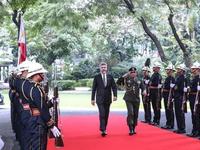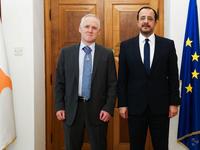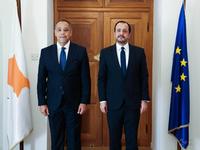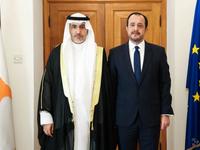Press Releases
.jpg)
11-09-2018 19:35
Address by the Minister of Foreign Affairs, Mr Nikos Christodoulides, at the Konrad Adenauer Stiftung on “Cyprus: An Anchor of Stability in The Eastern Mediterranean”
I am granted today the opportunity to attempt to present the incredible geopolitical dynamics of the Eastern Mediterranean, at the heart of which Cyprus, the south-eastern most corner of the European Union lies, a member state at the crossroads of Europe, Africa, Asia and the Middle East. To offer Cyprus’ unique, insider’s perspective of the region – as a country that forms an integral part of the Eastern Mediterranean, but is also part of the mosaic that is our common home, the European Union; to outline Cyprus’ vision of creating a web of cooperation in the Eastern Mediterranean that becomes the basis for the region transforming into a model of prosperity, stability, and peace, and in doing so generating a highly beneficial ripple effect for the European Union; to illustrate how Cyprus has decisively embarked on implementing this vision in recent years, as an anchor of stability, and as the EU’s lighthouse in a region inherently linked with Europe’s security; and finally, to make the case for why the question of how we address Europe’s challenges today, cannot be effectively answered unless we more actively engage with the Eastern Mediterranean, and address the issues the region faces.
Prior to unravelling these thoughts, allow me to express my deep appreciation and respect to the long history and exceptional work undertaken by Konrad Adenauer Stiftung. For over half a century this institution has been actively promoting the values that form the core of the European Union: democracy, freedom, liberty, peace and justice.
Almost fifty five years ago, in October 1963, Federal Chancellor Konrad Adenauer ceremoniously opened the extension of the Eicholz Political Academy, the predecessor of this thriving foundation. It wasn’t until a year later that the name was changed to ‘Konrad Adenauer-Stiftung for Political Education and Student Promotion’. As a historian, I cannot but focus on this institution’s roots and history; I firmly believe that a glance at history always holds answers to those seeking for them.
And so, as one of the greatest political and economic projects of the 20th century, the European Union – born from the ashes and horrors of World War II to become a Union not only of economies, but also a political Union of values– faces unprecedented challenges – starting with a world financial crisis that hit it hard, a migration crisis, Brexit – we must look back at our history, and draw lessons from it as we pave the future. All of these deep, complex challenges have shaken Europe to its core, and have placed incredible strain on the thread that unites the Union’s member states, holding them united. Critically, they have created cracks in the European Union’s cohesion, at a time when there is a shift of balance of powers in the international political order.
Crisis breeds opportunity. Cyprus knows this all too well, most recently faced with an economic crisis that led to the unprecedented bail-in decision by the Eurogroup in March 2013, which deeply affected the backbone industries of the country. Yet, Cyprus seized the moment, demonstrating resilience few thought possible, turning the crisis into opportunity to reform and address chronic weaknesses of the economy and the financial system. The Cyprus economy is now on a stable growth path to recovery; in fact 2018 is the 4th year of positive real GDP growth, higher than the Euro area average while recording the biggest annual unemployment decrease in the EU.
And so, the current challenging juncture in the European Union’s long and admirable history, must force us to reinvent, and to look for new grounds to breed cohesion. Chancellor Konrad Adenauer’s political life, encompasses all those elements that we need to look for in this difficult but necessary endeavour; a true European statesman who led his country from the ruins of World War II to a productive and prosperous nation that fostered close relations with France, the United Kingdom, the United States; deeply committed to a value-based international order, he achieved democracy, stability, international respect and economic prosperity for his country.
Chancellor Adenauer remarked that “when the world seems large and complex, we need to remember that great world ideals all begin in some home neighbourhood”. The neighbourhood I call us to take a closer look, as a source of answers, is the Eastern Mediterranean. A corner of the world full of challenges but also opportunities; a region that is inextricably linked to Europe’s security; taking charge of our own security as a Union inevitably means being more actively engaged in the Eastern Mediterranean.
Why is that so? Why is the Eastern Mediterranean important for Europe in particular, and the world in general?
In answering this question let us first consider the fact that at one Foreign Affairs Council after another, discussions, more often than not, centre around migration, at times threatening the unity between member states and the Union’s cohesion. Where do the root causes of the humanitarian migration crisis the EU stem from? From the region of the Eastern Mediterranean. We have consistently made the case in Brussels that unless we effectively address the root causes of the migration crisis, unless Europe becomes an active political actor in the Eastern Mediterranean - in Syria, Lebanon, in the Middle East Peace Process – we will not be able to effectively tackle the migration crisis in Europe. The same goes to other serious challenges we face at home, in Europe, such as the spread of violent extremism.
We must look for answers where these challenges breed, and we believe that Cyprus, a member state of the Union and at the same time a country of the region with excellent bilateral relations with its neighbours and a deep understanding of the dynamic of the region, can play a catalytic role in this direction.
A second dimension in considering the region’s geostrategic importance relates not to its challenges but to the promises it holds. It is a region witnessing remarkable demographic and social change. It is a young region, with over 40% of its population under the age of 25 according to the United Nations data. The population of the Gulf states doubling over the past 20 years to 51 million in 2015 according to the World Bank. The shift in global economic power that we have been witnessing has in fact placed the Middle East firmly in the middle of the world’s fastest-growing markets and at the heart of fast growing trade flows. There is also a pressing need for the region to diversify, to address youth unemployment, which at 25% is one of the highest in the world, and manage the rapid urbanization. There are over 3,5 trillion euro worth of projects planned or under construction in the Middle East and North Africa. At a time when the basic principles of free trade are being questioned, and when Europe needs to stand up for these principles and decisively assert its position on the world trade arena, the potential and needs of the region cannot be ignored.
A third parameter that renders it imperative to pay closer attention to the Eastern Mediterranean is its energy potential, which can contribute decisively to Europe’s energy policy of diversification as a route to greater energy security. According to the USA Geological Survey assessments, the Eastern Mediterranean region (the Nile Delta Basin and the Levantine Basin) holds enormous quantities of natural gas and oil. In fact, the total quantities of natural gas in the Eastern Mediterranean are estimated to be 9700 billion cubic meters. So far approximately 2800 bcm have been discovered in the Exclusive Economic Zones of Cyprus, Egypt and Israel. For comparison purposes let me just mention that the natural gas reserves of Norway are estimated at 2832 bcm, while the annual needs of the EU in natural gas are 350bcm.
The presence of energy giants in the region such as EXXONMOBIL, ENI, TOTAL, NOBLE, SHELL, to name a few, are proof of this potential. The Eastern Mediterranean’s immense potential, and how this can serve the goal of the EU for alternative energy route – with the political ramifications this entails - are evident from these numbers.
Our viewpoint is that hydrocarbons can become the new coal and steel, in a new regional context. A tool of cooperation and synergies that would create an economy of scale, an inviting environment for companies and investors; a tool that would meet the energy security needs of the region and that of the EU and gradually contribute to greater stability in relations among countries of the region and promote security and peace.
Having described only some of the parameters illustrating the importance of the region, I will proceed with my next premise, which is, the geostrategic value of Cyprus as a bridge between the region and Europe. The starting point to this premise, is none other than Cyprus’ geography, with which I started today’s presentation. Let us consider these distances to realise the proximity of Cyprus to the countries of the region: Syria is only 98 kilometres from Cyprus, Lebanon 150 kilometres, approximately a 25 minute flight from Larnaca to Beirut, Israel less than 250 kilometres and Egypt less than 350 kilometres.
And while more often than not our geography has been more of a curse, our determined efforts in the last few years have been to reverse this narrative, and turn our geographical position into a blessing, putting it at the forefront of our geostrategic value.
Recognising the rising importance of our immediate neighbourhood, and based on the long-standing close relations Cyprus enjoys with its neighbours, we have in recent years re-oriented our foreign policy; one of the core pillars of this re-orientation is that we have been actively and methodically enhancing and expanding our ties with the countries of the Middle East and the Gulf region.
Indeed, upon assuming my new responsibilities at the Foreign Ministry in March 2018, some of the very first visits I made were to Jordan, Egypt, Lebanon, Israel, subsequently to the Gulf – Saudi Arabia, United Arab Emirates. High on the agenda of the discussions is how to foster understanding and collaboration, how to construct a positive, results-oriented agenda between the EU and the region, how to get the EU more actively involved in the challenges but also the opportunities the region presents.
Our partners in the region see Cyprus as a credible, trustworthy, reliable voice between them and the Union, and despite their grievances on what they see as a lack of understanding by the Union, they are eager to engage and look for alternative, more constructive channels through which to do so. This positive agenda is indispensable in addressing the many challenges our region and the EU are called to address.
Cyprus is already advancing the cause, and in doing so, my argument goes, Cyprus has become an anchor of stability in the Eastern Mediterranean. How specifically does Cyprus do this?
Cyprus’ role as an anchor of stability is perhaps most vividly demonstrated by the web of trilateral cooperation mechanisms we have established in the region. Working with Greece, and others in the region, such as Israel, Egypt, Jordan, Lebanon and the Palestinians, Cyprus has created these fora that constitute a prime example of good neighbourly relations, a basic tenet of the EU and of the EU’s relations with third countries. The trilateral mechanisms are arguably one the most successful additions to Cyprus’ foreign policy footprint, and a manifestation of our strategy to create synergies and forge closer cooperation with moderate countries of the region. This innovative trilateral mechanism is creating and facilitating synergies in a broad range of areas: from political and economic cooperation to security, culture, innovation and education.
Energy was the trigger of the trilateral mechanisms, and has continued to be one of the central tenets of the trilateral mechanisms. Having realized the incredible energy potential of the region we embarked in negotiations that led to the conclusion of delimitation Agreements with Egypt, Israel and Lebanon. The delimitation of our seas has created a new regional dynamic and a new diplomatic framework. First, it created greater transparency based on international law. Second, it created a new economic border structure. And third, and perhaps most importantly, it set up a new framework for dialogue around a concrete shared goal.
The central tenets of the trilateral cooperation is that they are neither exclusionary nor exclusive, nor are they directed against any third country, but are an instrument for promoting cooperation. Here too it is important to understand that by their very nature, there is no “one size fits all” framework, but they are moulded and evolve in areas where there is a comparative advantage, including broadening the trilateral format to bring in additional partners in specific fields.
For example, Cyprus-Greece and Israel, have expanded their talks to include Italy and the European Commission in our discussions of cooperation on energy related issues. We are currently in advanced discussions with France on the creation of a new cooperation formation in the region. We are also in discussions with Gulf states for creating such mechanisms involving them, with a tailor made agenda. The trilateral formations have also grasped the attention of third countries such as Japan, which has placed the region of the Middle East as one of its foreign policy priorities.
During yesterday’s consultations with Foreign Minister Maas we had a thorough discussion on how Germany could also be involved in these regional developments in specific ways. Tomorrow I will be travelling to Athens and subsequently to Israel with the Greek Foreign Minister in order to meet Prime Minister Netanyahu in order to discuss, amongst others, the potential for enriching our trilateral cooperation, and perhaps, the formation of a new group involving our countries.
The trilateral formations are an example of what can be achieved when states with shared concerns and challenges but also with common interests and vision, join powers, rather than isolate themselves. In short, they are the embodiment of multilateralism.
Another example of how Cyprus is acting as an anchor of stability is our active role in the area of regional security and countering terrorism. For Cyprus this is a collaborative, multilateral effort. It is not enough to secure one’s country and borders, but close cooperation with reliable and like-minded partners is vital. To this end we are in close dialogue and collaboration with our regional neighbours, all recognizing for example that the nature of 21st century terrorism is international and fluid.
To this effect, Cyprus is an active member of a number of international efforts, including the Coalition against the Islamic State, and the Aqaba Process. We have actively, and in cooperation with some of our European allies, provided military assistance, and also provided non- military support to the EU efforts in the Sahel. We are also working closely with other, non-European partners, mainly with the United States. We cooperate with the US in providing specialized, mostly civilian type expertise, be it customs or border control that is able to identify and contain certain chemicals, better storage and handling. These are considered to be highly important in the focus that is being directed against the transfer of illegal and usually non-conventional substances that could be used to create havoc.
In fact, Cyprus actively contributed to the collective efforts of the international community for the destruction of the Syrian chemical weapons arsenal, following UN Security Council Resolution 2118, servicing as the host country of the support base of the Organisation for the Prohibition of Chemical Weapons-UN Joint Mission, and offering its infrastructure and facilities to other States which participated in the multilateral mission.
Cyprus also facilitates the deployment of United Nations Interim Force in Lebanon (UNIFIL) by hosting UNIFIL’s Maritime Task Force whose primary task is the preservation of the peace and security of the shores of Lebanon in a highly volatile region. German forces participating in UNIFIL are also facilitated.
At the same time, Cyprus supports Lebanon’s efforts to confront the immense challenges it is faced with, among others, through a productive military bilateral cooperation. In this regard, since 2015, Cyprus has donated arms and ammunition to the Lebanese Armed Forces and has offered technical assistance and training to its officers in the context of supporting Lebanon's sovereignty, stability, security and its state institutions. Cyprus has also contributed financially through the European Union in the efforts of Lebanon and Jordan to address the refugee crisis in their countries.
Esteemed guests,
Ladies and gentlemen,
To discuss the potential of the Eastern Mediterranean, its geostrategic value to the EU, and Cyprus’ role as an anchor of stability, and as a bridge between the EU and the region without referring to the Cyprus problem and the impact of reaching a just, viable comprehensive settlement ending the 44 year division and military occupation would have on the region, would be painting an incomplete picture.
A lot has been written and said about the Cyprus problem over the last four decades. It has kept politicians and diplomats fairly busy. And yet, despite its complexities, the heart of the problem is rather straight-forward. The Cyprus problem is a punch in the face of value-based international order, a flagrant violation of the most fundamental principles of international and European law. A problem of illegal invasion, subsequent occupation and violation of the sovereignty and territorial integrity of an EU member state, and a gross violation of fundamental rights and freedoms of Cypriots, Greek Cypriots and Turkish Cypriots.
I wish to stress the European dimension of the Cyprus problem because it is vitally important. The Cyprus question is a European question, and its solution must be a European one. With no permanent derogations that would render Cyprus a second class EU member State, and which would ultimately be a blow to European unity, cohesion, and to the value-based system the Union is. The best guarantee for a reunited Cyprus is its capacity as an EU member state. A pre-requisite for a united, sovereign Europe, is that its constituent parts – its member states – are also truly sovereign. The EU must actively uphold the principles that form its nucleus in the context of Cyprus, in an uncompromising manner to those who challenge the most basic tenets of European architecture. Solidarity is a pre-requisite to effective multilateralism.
A viable solution to the Cyprus problem, which is a feasible goal, would not only amplify Cyprus’ bridging capacity, but would also mark a paradigm shift in bringing about peace and stability in the region. This would certainly serve the interests of our key partners, of the EU, and certainly of the region. It goes without saying that for the good of regional stability, Cyprus needs to remain a truly independent state, without third party interference, so as to continue to function as a reliable partner and security provider in the region.
Dear friends,
To the deep and complex challenges we face, Cyprus strongly believes that the answer is more Europe, that we must look back to the core of the values that bind our Union together and project it outwards.
At times when international relations are becoming more introvert, Europe must become more extrovert, build more partnerships and synergies, diversify, and in doing so, it is crucial that it pays closer attention to the Eastern Mediterranean.
“When the world seems large and complex, we need to remember that great world ideals all begin in some home neighbourhood”. The Eastern Mediterranean is the EU’s neighbourhood, and a vital one at that as I hope this presentation has outlined. Cyprus is a natural bridge between the two, and the Union’s lighthouse in the Mediterranean sea. We stand ready to work with the Union, with all its member states, including Germany, a country with strong leverage in the region and the world scene, in order to fulfil the immense potential and promise of our immediate neighbourhood, to the benefit of the region and of Europe.
-------------------------
LF/II
Relevant Press Releases







